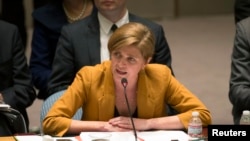“We bowed our heads in remembrance of the more than 800,000 men, women and children who were so ruthlessly deprived of life,” U.S. Permanent Representative to the United Nations Ambassador Samantha Power said recently in marking the twentieth anniversary of the Rwandan genocide at a United Nations Security Council briefing on the prevention and fight against genocide.
“As a global community, we recognize that mass atrocities may emerge from a variety of scenarios,” she said. “We’ve begun to identify telltale patterns and indicators. We’ve agreed on the value of vigilance to prevent unstable situations from unraveling. We have affirmed . . . the duty of each government to protect its citizens from mass atrocities. And we have stated our preparedness, under the United Nations Charter, to respond when states require help in fulfilling that duty.”
“It is both fair and profoundly unsatisfying to admit that our successes have been partial and the crimes against humanity that persist are devastating,” she continued. “Too often, we have done too little, waited too long, or been caught unprepared by events that should not have surprised us.”
Moving forward, Ambassador Power indicated that we have to do a better job confronting and defeating the practitioners of hate.
“Part of protecting against mass atrocities is preventing the conditions that allow them: rampant discrimination, the denial of human dignity, and the codification of bigotry,” Ambassador Power said. “No one should be targeted for violence simply because of who they are or what they believe.”
“In our collective effort to prevent mass atrocities, we must make creative use of every tool we have: human rights monitoring; diplomatic missions; technical assistance; arms embargos; smart sanctions; peace operations; judicial inquiries; truth commissions; courts; and other measures designed to influence the calculations of perpetrators who . . . every day they are doing a cost benefit analysis . . . about whether the cost of moving forward exceeds the benefits from their often warped perspective,” she emphasized.
“We must remember . . . that preventing mass atrocities is a global responsibility,” Ambassador Power said. “We must ask every state to consider whether there is more it can do to remove the political roadblocks that impede effective action.”
“As a global community, we recognize that mass atrocities may emerge from a variety of scenarios,” she said. “We’ve begun to identify telltale patterns and indicators. We’ve agreed on the value of vigilance to prevent unstable situations from unraveling. We have affirmed . . . the duty of each government to protect its citizens from mass atrocities. And we have stated our preparedness, under the United Nations Charter, to respond when states require help in fulfilling that duty.”
“It is both fair and profoundly unsatisfying to admit that our successes have been partial and the crimes against humanity that persist are devastating,” she continued. “Too often, we have done too little, waited too long, or been caught unprepared by events that should not have surprised us.”
Moving forward, Ambassador Power indicated that we have to do a better job confronting and defeating the practitioners of hate.
“Part of protecting against mass atrocities is preventing the conditions that allow them: rampant discrimination, the denial of human dignity, and the codification of bigotry,” Ambassador Power said. “No one should be targeted for violence simply because of who they are or what they believe.”
“In our collective effort to prevent mass atrocities, we must make creative use of every tool we have: human rights monitoring; diplomatic missions; technical assistance; arms embargos; smart sanctions; peace operations; judicial inquiries; truth commissions; courts; and other measures designed to influence the calculations of perpetrators who . . . every day they are doing a cost benefit analysis . . . about whether the cost of moving forward exceeds the benefits from their often warped perspective,” she emphasized.
“We must remember . . . that preventing mass atrocities is a global responsibility,” Ambassador Power said. “We must ask every state to consider whether there is more it can do to remove the political roadblocks that impede effective action.”






